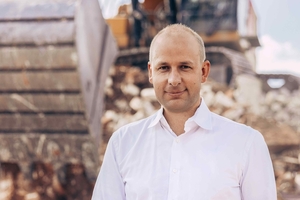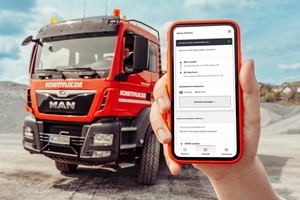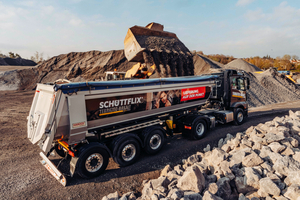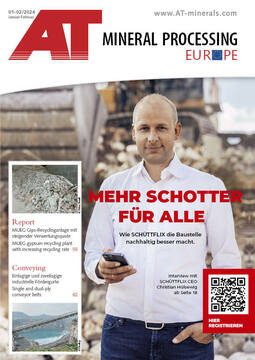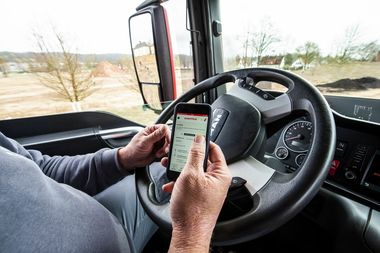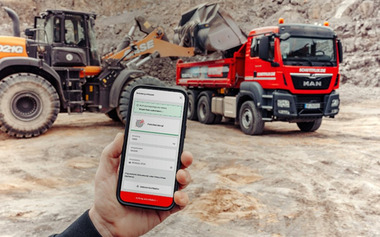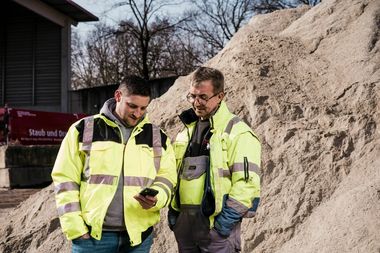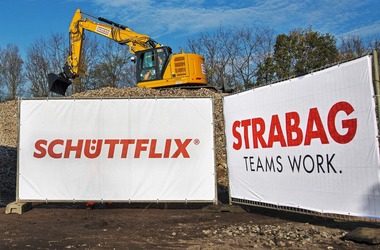Interview with Christian Hülsewig
Digitizing the construction industry and making it greener, simpler and more efficient in the process – the German ScaleUp Schüttflix was launched in 2018 to achieve nothing less than these goals. Schüttflix is one of the first digital logistics hubs for the construction industry.
The platform connects construction companies, building material suppliers, waste disposal companies and freight forwarders. With just a few clicks, contractors can compare prices in the app and order or dispose of bulk materials and transportation directly. Instead of being regionally fragmented and non-transparent, Schüttflix creates a functioning, efficient market for all common bulk materials in Germany, Austria, Poland and the Czech Republic for the first time.
Schüttflix enables its partner forwarding companies to optimize their route planning, which leads to fewer empty runs and therefore greater sustainability. In addition, Schüttflix supports construction companies in optimizing and digitizing their processes with data for real-time analysis and digital documents (invoices, delivery bills, weighing documents). By linking demolition and disposal companies and the associated recycling material, Schüttflix creates a real lever for a more circular economy and intelligent material flow management.
The company generated sales of around € 125 million in 2023 and currently has over 13 000 customers and partners on the platform.
In an interview with AT MINERAL PROCESSING, CEO and co-founder Christian Hülsewig talks about the challenges facing the industry and the opportunities presented by digitalization and genuine value chains.
Construction sites and the extraction of mineral raw materials – where does digitalization come into play?
Simply everywhere. The construction industry will definitely not work without digital processes in the future! Being able to order and transport bulk materials efficiently and quickly with just a few clicks, linking supply and disposal intelligently and efficiently and thus laying the foundation for closed material cycles and a resource-conserving construction industry – all of this is simply much easier with a functioning digital platform. Customers and partners can compare the costs for the delivery of mineral raw materials by cell phone, mark on a map where the goods are to be delivered and thus handle the entire ordering process digitally – from ordering to weighing notes and delivery bills to invoicing.
In the disposal process, our customers and partners are able to track all waste management and disposal-related information during the ordering and transportation process and trace it at any time. The result: less paper, more transparency, lower costs.
Schüttflix is still a young but very agile company. What new developments has your company launched in the last 12 months?
Since January 2023, we have been offering the fully systematic disposal of construction and demolition waste in addition to the supply of bulk materials to construction sites. Since then, waste producers have been able to control their disposal processes independently and digitally via the Schüttflix app. Since last year, we have also been using artificial intelligence to better link our analog and digital processes. The AI enables us to automatically integrate conventionally printed weighing slips into the Schütt-flix platform via an OCR (Optical Character Recognition) application. With the image-to-text application, the truck driver only has to select the scan function in the Schüttflix app with his cell phone after weighing at the producer and photograph the weighing slip. All relevant information, figures and data are automatically read out and digitized. This means the customer can see everything in real time at all times.
The circular economy is a hotly debated topic. Schüttflix also wants to promote the circular economy in the area of mineral building materials with its app – how exactly does Schüttflix go about this?
The constantly growing number of customers and partners on the platform opens up incredible opportunities, especially between individual construction sites.
One example: When a road is being built in Berlin, the gravel no longer necessarily has to be delivered as a primary construction material from Lusatia over 150 km, but in future will ideally come from the demolition project just around the corner. There is enormous potential here – both economically and ecologically. This saves resources, time and money.
How far does Schüttflix intervene in secondary material processing? Can the materials offered by Schüttflix also be shredded or sorted?
We offer the entire value chain with the help of our network. The use of mobile crushing plants is also possible through us, although this is often only worthwhile for larger construction sites with high volumes, as the Substitute Building Materials Ordinance has created significantly more difficult processes here. We take smaller volumes to our partners’ recycling centers and process them on site.
How do you see the future development of Schüttflix on the one hand and the construction materials industry in general on the other?
Schüttflix has set out to digitalize the construction industry across Europe, make it more efficient and significantly greener. We have already achieved this very successfully in parts and we are proud of this. We are now focusing on the circular economy and reducing emissions as we continue to develop our business area. Our concept – combining supply and disposal – forms the ideal basis for this.
The construction industry is currently facing considerable challenges due to the change in interest rate policy, particularly in residential construction. Only falling interest rates or other subsidy programs can help. We are focusing on infrastructure issues such as road construction, rail and our energy transition, so there is more than enough for us to do even in this interest rate environment.
What would you like to see from politicians in order to really implement the circular economy in the building materials industry?
Building materials that leave the construction site are not automatically waste! A large proportion can now be processed and reused as RCL. You could say that demolition is the ballast plant of the future! Last year, the new Substitute Building Materials Ordinance caused a lot of misunderstanding in the industry, especially at recycling centers, because it made on-site processing on construction sites much more difficult.
In addition, digitalization and the circular economy should not only be discussed and decided in Berlin, but also implemented nationwide. In reality, paper and natural stone evidence is still all too often required when awarding public contracts, particularly at municipal level. A rethink is urgently needed here.

